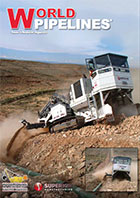Editorial comment
Over the past few months, the World Pipelines team has been enjoying using Twitter with increasing frequency (we use the handle @Energy_Global). We tweet links to news stories and contract awards on our website (www.energyglobal.com) and we socialise with pipeline companies and commentators, retweeting interesting news and opinions and generally enjoying the company of pipeline-minded people.
Register for free »
Get started now for absolutely FREE, no credit card required.
In the course of our online interactions, we find ourselves constantly confronted by the sheer volume of anti-pipeline sentiment on the site. It’s clear that oil and gas pipelines are a target both physically and politically. On the one hand, they are a flashpoint for environmental activists, particularly those protesting oilsands development and its carbon- intensive nature, or pipeline rights-of-way, or pipeline leaks. On the other hand, pipelines are a political drum to bang: a weapon to wield in the ongoing battle for votes and a national, or international, platform. But online, everything is magnified. Twitter and other sites like it provide a medium for easily repeatable soundbites of protest and hyperbole. Opposition rhetoric and protest rallies get a lot of coverage; safety records and advancements in pipeline technology do not. The facts sometimes get lost in the re-telling. The saga of the Keystone XL pipeline (KXL) is told many times each day online, as we wait for US President Barack Obama to make his final ruling (this is expected late in 2013). As to Obama’s latest musings on the subject? Well, in a recent interview with The New York Times, Obama said he would evaluate construction of the Keystone XL pipeline on the basis of whether it would significantly contribute carbon to the atmosphere. He also disputed one of the main justifications for the pipeline – its economic benefits – by refuting arguments that the pipeline would create thousands of jobs and be a boon to the US employment statistics. “Republicans have said that this would be a big jobs generator”, Obama said. “There is no evidence that that’s true. The most realistic estimates are this might create maybe 2000 jobs during the construction of the pipeline…then after that we’re talking about somewhere between 50 and 100 jobs in an economy of 150 million working people”. KXL’s TransCanada has reacted furiously to this, claiming it calculates a potential 40 000 jobs to be created. In the course of the interview, Obama suggested that Canada “could potentially be doing more to mitigate carbon release”, which suggests he is open to the idea of enforcing ways to ease environmental impact of any approved pipeline, as opposed to blocking its construction in the first place. Obama confirmed that he is waiting for US Secretary of State John Kerry’s recommendation before he makes a decision. In essence, the terms of approval have been set firmly within the Secretary of State’s remit, and that should be fine for KXL proponents. Most want the pipeline approved in accordance with recognised and measured expertise on the project’s environmental impact in the US and abroad. The US State Department ruled in March 2013 that the Keystone XL pipeline would not increase greenhouse gas emissions, stating that Canadian oilsands would be mined regardless of whether the pipeline was built. However, opponents demanded a more detailed study and so we hang on, awaiting the final environmental verdict. As we wait, the surge of KXL information online grows. In the wake of the terrible tragedy at Lac-Mégantic in Quebec, Canada, where a train carrying oil derailed and exploded, killing at least 50 people, debate about the safe transport of oil and gas became ever more enlivened on Twitter, as the worldwide media turned to issues of human safety over environmental concerns. Might pipelines be safer than rail? tweeters asked. Might underground transport turn out to be less hazardous than overground? Might Keystone XL pipeline be the safer option all round? The debate rages on @ length.


